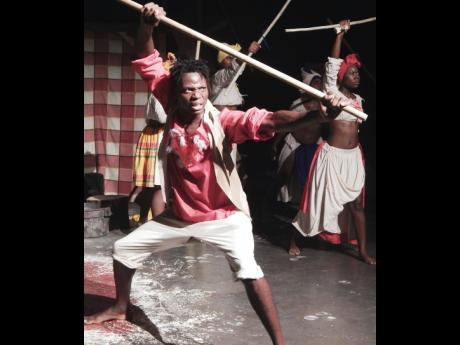For the Reckord | C'bean sensibility to Drama School's choices
The programme blurb for RawIe Gibbons' play I Lawah, recently produced at the Edna Manley College of the Visual and Performing Arts (EMCVPA), repeats the institution's mission "to enrich the aesthetic sensibilities and promote the cultural diversity of the Caribbean through the highest quality education and training in the visual and performing arts."
By accident or design, the five EMCVPA School of Drama productions planned for the current school year resonate strongly with that mission. Two, I Lawah and Dennis Scott's Dog, were produced in the semester which just ended, while the other three will be produced next semester.
All five were discussed at the school's December faculty meeting, chaired by director Pierre Lemaire. There was a consensus among lecturers that the productions were successful, especially where student involvement was concerned.
Actor, broadcaster and part-time lecturer Jean-Paul Menou said that one of his students, assigned as stage manager for a production, saw her classmates having so much fun during rehearsals that she wanted to be on stage.
Trevor Nairne, director of Dog, said the play encapsulates "centuries of exploitation and injustice (with) the dogs at war with each other - the haves versus the have-nots". He added that one of Dog's many productions, since the first in 1974, created history by being selected by a special Pan Caribbean theatre company to represent the region at a Caribbean Arts Festival in London.
Director Camille Quamina described I Lawah as "a folk fantasy about a warrior, his lover and a community composed of a Caribbean underclass, who must all confront personal conflicts and social upheaval in order to discover the true nature of heroism and the right to be masters of their destinies."
"The play is set in Trinidad in 1881, at the time of the Canboulay riots. The characters and situations transcend and translate throughout the Caribbean, as the historical narrative and setting may also speak to the circumstances of contemporary Jamaica".
Still meaningful
Lemaire expressed satisfaction that the plays, previously staged at the school, were "still meaningful after so many years". He gave me details about the upcoming productions.
Slated to open on February 10 is a staff production comprising seven 10-minute plays by various authors. Staff members will be the show's actors, directors, designers, technical personnel and producers. Chuckling, Lemaire said the exercise would give the students a chance to see that their lecturers are also theatre practitioners.
El Numero Uno, to be directed by Lemaire, who calls it "a joyful play", will open in March. A children's play, it was written by Pamela Mordecai, a Jamaican educator and writer who now lives in Canada, and had its world premiere in Toronto in 2010 at the Lorraine Kimsa Theatre for Young People. It is about a pig who finds himself responsible for saving his community from environmental disaster.
The school's former director and current directing lecturer, Eugene Williams, will direct Errol John's Caribbean classic Moon on a Rainbow Shawl, which won the UK's 1957 Observer Award. Numerous productions have followed, the most notable being, perhaps, the 1962 one in New York which featured James Earl Jones, Cicely Tyson and Vinette Carroll, among others. That production earned James the Obie for Best Off-Broadway Actor and Carroll the Obie for Distinguished Performance by an Actress.
In a recent talk on 'Heritage and Creativity' at the EMCVPA, Williams, who has spent some 37 years at the college, spoke of the institution's regional focus from its early years. He said: "In the School of Drama, apart from Prof. Rex Nettleford's course, Caribbean Studies, which was shared across the college campus, and in addition to the menu of courses that were fashioned in the Western tradition, we had laboratory courses in Caribbean culture and performance, community drama and vibrant annual seasons of productions, most of which were Caribbean or drawn from the African diaspora, either in the text or the aesthetic of performance.
"The schools of Dance and Music had their equivalences, too, where traditional and contemporary cultural forms were explored, both as cultural history and ways of seeing and interpreting the world, as well as the sources of shaping a Caribbean performance aesthetic through the creative imagination."
This year marks 40 years since the amalgamation of the EMCVPA's schools of the visual and performing arts which, prior to 1976, had been autonomous. A series of celebratory activities that began in October with the staging of Dog will culminate next October with the 2017 Rex Nettleford Arts Conference, which will look at arts and culture for the 21st century.









